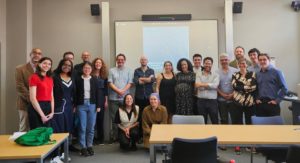Transitional justice and human rights have an intimate but complicated relationship. Transitional justice is often considered a human rights enterprise and often enjoys legitimacy because its measures are considered to centre the human rights of victims of serious abuses. At the same time, human rights are often treated as being in alignment with the objectives and processes of transitional justice, and as key tools in the pursuit of justice more broadly. Analytically and in practice, however, transitional justice and human rights are two distinct fields, and their relationship – including their differences – necessitates explicit theorisation and concrete exploration. As transitional justice becomes the paradigmatic understanding of “justice” in contexts of transition, and as human rights retain their hold globally on mobilisations against injustice, critical scrutiny becomes increasingly vital.
Human rights discourse is increasingly carceral, prioritising criminal law as the main response to human rights violations and focusing on the mobilisation of state coercion to protect human rights. These developments have occurred in conjunction with the consolidation of an anti-impunity paradigm in transitional justice discourse and practice. These trends distill a penal accountability paradigm within transitional justice and human rights: one in which punishment is deemed the most potent way of accounting for past wrongdoing and preventing future wrongdoing. At the same time, transitional justice mechanisms are often non-carceral, while within transitional justice discourse the role of law and the state in shaping responses to human rights violations has been problematised, and emphasis on grassroots responses and indigenous practices is growing.
These converging and diverging trends necessitate critical exploration. Moreover, growing mobilisation around coloniality and racial (in)justice pushes for an overdue reckoning for both transitional justice and human rights. Finally, acknowledging the traditional neglect of economic and social rights in both mainstream human rights discourse and transitional justice theory and practice invites us to rethink the limits of dominant visions of accountability for human rights violations, including in (but not limited to) post-conflict settings affected by widespread poverty and inequality.
A critical examination of these, and other, issues begins by treating transitional justice and human rights as two fields that are related but distinct, and welcoming perspectives from a variety of experiences, disciplines and jurisdictions, notably from the Global South. The ‘Transitional Justice and Human Rights’ network therefore seeks to bring together scholars and practitioners in the fields of transitional justice and human rights, to build a global, multi-disciplinary community in which knowledge is exchanged and ideas developed with due regard to both theory and practice.
Call for Abstracts
An inaugural workshop on Paradigms and Transformations in Transitional Justice and Human Rights at the University of Birmingham on 2 May 2025 seeks to bring together leading experts in these fields. The aim of this initial workshop is to explore dominant visions of accountability within transitional justice and human rights, as well as to develop ideas for future collaborations by exploring key aspects of the relationship between transitional justice and human rights – synergies, tensions, and other patterns and divergences. We will consider questions including:
- How are the transitional justice and human rights fields related and how are they distinct?
- What has shaped the anti-impunity paradigm in these fields?
- What visions of accountability and prevention in each field have been displaced by, or could displace, penality?
- How might human rights be mobilised to critically examine problematic (racial/colonial/carceral) paradigms within transitional justice, and vice versa?
We invite both academics and practitioners working in the fields of transitional justice and human rights to submit abstracts (max. 300 words) on these topics by 29 November 2024 by email to Kate Webster: klw564@student.bham.ac.uk. We will invite the participants selected to share draft papers or paper outlines (minimum 2,000 words – maximum 8,000 words) prior to the workshop to facilitate discussion.
Please note that we have very limited funding but can consider requests to subsidise travel and accommodation if no institutional funds are available to you for this purpose.
We look forward to seeing many of you in Birmingham!
The organisers:
Colleen Murphy (University of Illinois Urbana-Champaign)
Natasa Mavronicola (University of Birmingham)
Felix Torres (University of Birmingham)
***
A follow-up
The UoB/UICI Human Rights and Transitional Justice Network was successfully launched at BLS on 2 May 2025. Organised by Professor Murphy, Professor Mavronicola, and Dr Torres, the inaugural workshop convened colleagues from the Global South, Europe, the US, and the UK to critically examine the relationship between transitional justice and human rights.
In a well-attended and engaging full-day session, presenters challenged traditional paradigms in transitional justice and human rights discourse. They explored diverse notions of accountability and justice, as well as the potential—and pitfalls—of expanding transitional justice to address broader processes of social transformation.
The event concluded with a compelling keynote address from Professor Colleen Murphy, who offered a critical reflection on contemporary US politics through the lens of transitional justice.
This inaugural workshop marked a vital step in consolidating this team of researchers and fostering engagement with colleagues interested in future collaborative activities.

